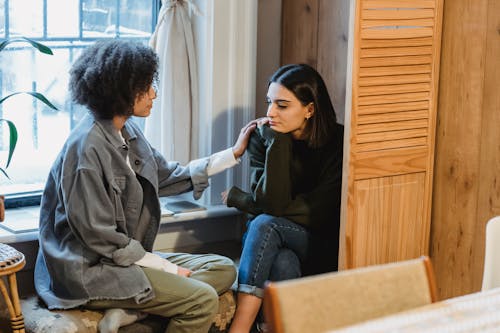When a loved one tells you they’re going to therapy, it can be difficult to know how to react. Our immediate thought is concern – are they okay? Why are they going? And then our next thought is – can I ask them that? Why couldn’t they talk to me? Is this something I’m supposed to talk about or do I let them come to me?
We want to be sensitive, but also open and let them know that we’re always there to support them. But with therapy, we can clam up, thinking that our loved one mightn’t want to talk about it, or that it might be painful for them.
In reality, most people don’t mind addressing the fact that they’re seeking help, especially if they’re the ones who brought it up. There are lots of ways to be there for someone when they are going through therapy.

One really important thing to remember is to be open to discussing it but also to leaving it alone if they ask you to. Even if they have told you about it, it’s probably best to follow their lead here. If they bring it up again, like something they discussed with their therapist, it’s totally fine to follow that up with a question about how therapy is going or what the therapist said or what they’re like. They’ll let you know their boundaries around the discussion – what they are and aren’t willing to discuss.
They may tell you they’ve been given ‘homework’ by their therapist – to get out of their comfort zone or to do something that’s been challenging them. Let them know you’re there to help them if they want it, but also be willing to step back and let them do it for themselves if that’s something they need.
Leading by example is also a good idea, so cope with your own problems in a healthy manner. If your go-to after a difficult day is bottling up emotions or avoiding sharing what’s bothering you, you’re not exhibiting the best example for anyone to follow. We all have our own ways of coping, but it’s important that they’re healthy and good for you and actually deal with the problem.

Seeing you looking after your nutrition, your mental state and your physical health is a good example to give your friend who may be struggling to cope with difficult emotions right now. Practising yoga, cooking yourself a good meal and talking about your difficulties with friends and families are all good ways to show healthy coping mechanisms when struggling.
Be sure to listen rather than relate. Telling someone you’ve felt what they’re feeling comes from a good place – you’re trying to let them know they’re not alone and expressing solidarity with their scary thoughts and feelings. But in reality, it can feel like you’re taking over the conversation. When they tell you about a feeling or situation and you say ‘I totally get that, one time I…’, you’re taking ownership of their experience, when you don’t know what this person may really be feeling.
Being a listening ear is far more helpful, even if it may feel like you’re being a little useless at the time. More than likely, when someone is telling you these difficult things, it’s because they need to get it out, rather than be told ‘I understand’. Asking question can show you’re listening if they need it.

Of course, it's also really important to have your own boundaries. Being leaned on for support constantly can be draining, especially when we're worried about our loved one. Be sure to have boundaries set so that you can look after you as well, and are able to take time for your own self care to avoid burning out while caring for everyone around you.







